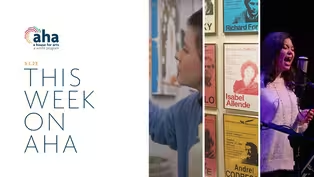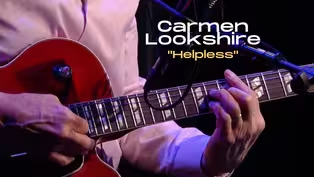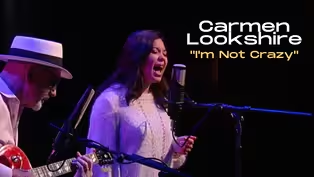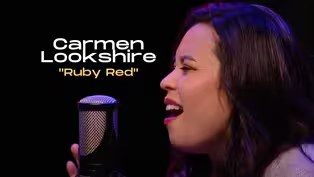
Inside the New York State Writers Institute w/ Paul Grondahl
Clip: Season 8 Episode 20 | 11m 10sVideo has Closed Captions
Discover the history and impact of the NYS Writers Institute with Paul Grondahl on AHA.
Jade Warrick sits down with Paul Grondahl, the Opalka Endowed Director of the NYS Writers Institute, to explore the Institute's rich history and the impact it has had on the literary world. Founded by Pulitzer Prize-winning author William Kennedy in 1983, the Institute has hosted over 2,500 guests as part of its Visiting Writers Series.
Problems playing video? | Closed Captioning Feedback
Problems playing video? | Closed Captioning Feedback
AHA! A House for Arts is a local public television program presented by WMHT
Support provided by the New York State Council on the Arts (NYSCA), M&T Bank, the Leo Cox Beach Philanthropic Foundation, and is also provided by contributors to the WMHT Venture...

Inside the New York State Writers Institute w/ Paul Grondahl
Clip: Season 8 Episode 20 | 11m 10sVideo has Closed Captions
Jade Warrick sits down with Paul Grondahl, the Opalka Endowed Director of the NYS Writers Institute, to explore the Institute's rich history and the impact it has had on the literary world. Founded by Pulitzer Prize-winning author William Kennedy in 1983, the Institute has hosted over 2,500 guests as part of its Visiting Writers Series.
Problems playing video? | Closed Captioning Feedback
How to Watch AHA! A House for Arts
AHA! A House for Arts is available to stream on pbs.org and the free PBS App, available on iPhone, Apple TV, Android TV, Android smartphones, Amazon Fire TV, Amazon Fire Tablet, Roku, Samsung Smart TV, and Vizio.
Providing Support for PBS.org
Learn Moreabout PBS online sponsorship- To start, how did you get into journalism?
- It's a weird story and a long story.
I work with a lot of students in journalism classes and I tell them up front, I'm honest, "I never took a journalism class."
I'm an English literature major, undergraduate, graduate school.
I got used to rejection, which is a great part of the job as a journalist.
I got rejected probably a couple hundred times when I sent out resumes to newspapers because I didn't have a journalism degree.
I kept pestering the Albany Times Union, and on my third try, the great, late, legendary editor, Harry Rosenfeld, gave me a shot.
So I started on night police in 1984.
- Awesome.
What did- - Long before you were born, I'm sure, Jade.
- Just a little bit, just a little bit.
- I'm going back to ancient history.
- So what is a night police?
Is that like a night crawler that we- - It's like a night crawler.
I was just out of graduate school.
I had worked at my hometown newspaper in Tacoma, Washington through college.
I had work study.
First generation college student, proud of that.
So I had a little bit of skills but I had not covered hard news.
So they sit you near the police scanner and nothing good happens, as you know, after 1:00 AM or 2:00 AM.
And it was always tragedy: shootings, fires, explosions.
I remember on probably the third day I was there in 1984, in the summer, I started in August, got a call.
And when you start hearing multi-company called in, emergency squads, you know it's bad.
So it was out near Hoosick Falls, Route 7.
Convertible, young woman, 19 years old, carrying nieces, nephews, neighbors, a bunch of little kids back from an ice cream thing, hit a tree at full speed.
And you get out there and they're picking up little children from a field.
And you realize, why are you there?
To tell a story, but a horrific, sad, human story.
So the first thing I learned is to be a person, and a journalist, with a capital J, second.
And I've seen on so many scenes like that, no offense to TV people, but sometimes they come in with hot lights and a hot mic.
And I would treat the way I would want to be treated at the worst moment.
I sat with families, where their son or daughter was just bleeding out.
I sat in kitchens with kids who had just overdosed.
And when you see kind of the worst of humanity...
But the beauty is, it's the moment where they want to share the story of the loved one that they just lost in some horrible, traumatic way.
And that gives you empathy, I think, and gives you an insight into human condition.
Then, I've probably done 10,000 stories for the Times Union, and you try to leaven it up with happy ones.
I know you're a happy person.
When I see you, you're always smiling and laughing.
So there's heavy parts, but you try to leaven it up with some fun stories, too.
- Well, what is your work usually focus on?
Like what are your themes?
- I like human interest stories.
In particular, people stories, stories about the underdog, someone overcoming a terrible illness or from the ground up.
I like people who are first generation college students, students came up the hard way.
I like stories that sort of have an unexpected twist.
I also did long projects on domestic violence, homelessness, mental illness, prison issues.
And you take on those big subjects and you sort of have to find real people.
So it's always about the humanity, the real people behind it.
And that's what I like about storytelling.
- And do you think your experience within being a night crawler with the night police, that kind of led you to being this more empathetic, people-first type of journalist?
- Absolutely, because when you see people at their most vulnerable and after they've just experienced a trauma, you sort of realize that you're there first to do no harm.
I mean, journalists do take a kind of Hippocratic Oath.
And the other thing that always stuck with me, even though I didn't take a journalism course, I sat next to really good journalists, really quality journalists, and I learned, kind of an apprentice.
And it was the saying, "Comfort the afflicted and afflict the comfortable."
It's perfect advice.
So we do a lot of investigative work, go after bad corporate entities or corrupt business people or corrupt politicians.
That's a big part of journalism, too.
- Yeah.
And that's very important because journalists really do lead the way to getting rid of- - Yeah.
The fourth estate.
We're supposed to be the voice and ears of the people.
So I like to write about people that don't have a voice, kind of the voiceless.
But we also like to hold accountable people with great power and people with great privilege.
So it is an honor to be a journalist.
That's why I still write a weekly column for the Times Union, even though it's been six years.
I've been gone six years at the Writers Institute.
- Oh, wow.
- Yeah.
- Well, thank you for doing the good work, and every journalist out there.
- It is a pleasure, you know what I mean?
I mean, it's storytelling.
It's seeing really interesting people.
People say like, "Why don't you write about yourself?"
I said, "I'm not that interesting.
I'm average."
There's so many more interesting people out there that have done beautiful things.
- Oh, cool.
So I know you're the executive director of the New York State Writer Institute.
- Yes - Correct?
- Yes.
Just director.
- [Jade] Just director?
- But I actually have a new title, the Opalka Endowed Director.
Just in the last couple weeks it was announced- - [Jade] Oh, wow.
- ... that Chet and Karen Opalka, who are generous philanthropists, specifically for the arts, endowed a directorship in my name, a $1 million directorship that will go in perpetuity.
So every year, there will be a money available to my successor and the next successor after me to fund really diverse, interesting program.
So it's an endowment that never runs out, which is a beautiful thing.
- [Jade] That is amazing.
Go Opalkas!
- They're wonderful people.
So I am the Opalka Endowed Director.
- Awesome.
- Officially, in the last two weeks.
Yes.
- Well, congratulations.
- Thank you.
- Well, so give us a little bit about the New York State Writers Institute, for folks who don't know.
- Yeah, so we were founded, this was the big announcement two weeks ago, start of our 40th season.
Chet and Karen Opalka were there, we announced this gift.
It was just beautiful.
But we're 40 years.
We were founded by William Kennedy.
He used some of his MacArthur Genius grant money to fund.
He always wanted to bring world-class writers in every genre, from many countries, to our campus and to Albany.
And that's what we've done for 40 years.
We've had over 2,500 writers, Nobel Prize winners, Pulitzer Prize winners, Booker Prize winners, the greatest writers in every genre, and every kind of diversity you want to measure.
So it's been a wonderful thing.
And we keep it free and open to the public.
It's generous people like Opalkas and our sponsors.
We don't charge ticket prices, which you would find in most cities, like 92nd Street Y in New York City has a lot of the same authors and it'll cost you a lot of money to go there.
So we present this free and open to the public, because of our sponsors.
So it's a wonderful thing.
- And very accessible.
- [Paul] Yes.
- So why do you think the Writers Institute is important for the writers community, besides it being accessible?
- So we also hold free workshops.
We do them in person, we do them online now to be acceptable, I mean more accessible, sorry, to people.
And we also have a film festival coming up on April 1st, open to young filmmakers.
We do a short film competition.
We have a special category for students, which we love to get students involved.
We have a book festival.
We have all the local writers come, talk about their books, sell their books.
So we really sort of cultivate, support, and enhance the local writing community.
And they're invited and involved on every level of what we do, from volunteering to being on stage with our visiting writers, which is great fun.
- That is.
- [Paul] Yeah.
- And what's one of your favorite events so far within your history of this?
- Oh, we've done so many.
I mean, one of the great events, I got to interview on stage a Supreme Court Justice, Sonia Sotomayor.
- Oh, I love Sotomayor!
- And after about three minutes she said "Do you mind if I walk around?"
I said, "You're the Supreme Court Justice, I'm not gonna say no."
She had a wireless mic.
She walked all over SEFCU Arena.
There were like 5,000 people there.
She was pausing for selfies, hugging people.
I mean, a real pro.
And there's been so many.
I mean, Salman Rushdie after the Fatwa, so we waited 30 years to get him.
Unfortunately, he got attacked, as you know.
This is serious, what's going on.
We're also doing sort of symposium looking at these divisive issues right now and the ugliness, that's also part of our dialogue and conversation in this country.
So we've also addressed a lot of that, with attacks on the free press, people not being open and accepting of other viewpoints.
So we also brought in authors that talk about that, as well.
- Now do you have any input within attacking the free press?
Because everyone knows, you're a journalist, so how do you handle that?
- Yeah.
We've actually hosted four major symposium, symposia, the plural, Telling the Truth in a Post-Truth World.
Started after President Trump was elected, what was going on with the press.
I mean, he called the press the enemy of the people, and we don't take that lightly.
I think he was serious and a lot of people followed him in that thought.
- It's terrifying.
- So anyway... very terrifying.
So we've had a succession of those.
And most recently, we looked at hacking, cyber wars, bots.
And now with AI, the University of Albany, where the Writers Institute is based and where I also teach, they're going heavily into AI because that's also an incredible opportunity, but a scary opportunity in terms of personal freedom, civil liberties, surveillance.
So the world's moving fast and we try to address it at the Writers Institute, as well as time-honored, classical poetry or literary fiction.
We also address current issues with current books and the greatest experts on every topic.
- Wow.
- [Paul] Yeah.
- So there really is a little bit of something for everyone.
- We love that.
We had Melissa Gilbert, she had a memoir, Little House on the Prairie.
We had kids from five and seniors to 85 in that audience.
- Wow.
- [Paul] And filled every seat in the house, 400 people.
Also, we're not just all highbrow.
We like to...
When I started at the Times Union, this always stuck with me, too.
The old timers who'd been there for a while, they called me College Boy because I had a graduate degree in English, which doesn't really get you anywhere.
You have to learn to be a reporter.
But they called me College Boy.
They said, "Remember, the people who buy this paper, the ads that support it, eighth grade reading level on average."
And I've never forgotten that.
You can't forget when you're on a college campus that you're on kind of a bubble.
And there's a lot of people who are struggling and I like telling those stories, I like seeing what they're overcoming and dealing with.
We talked about the underdog story.
So I always kind of remembered that.
PhDs and Ivory Tower is a small, little slice of the world.
It's a big world out there.
- [Jade] True.
- And I try to reflect that in our stories and we reflect that in what we program at the Writers Institute.
- That's really a beautiful and amazing thing that you guys are doing.
And how do folks and writers get involved with the Institute?
- Well, we've got a really dynamic website, NYSwritersinstitute.org.
And you can follow us on all social media.
We have two or three events some weeks and we have a really busy schedule.
- Well, thank you, Paul - [Paul] Thank you, Jade.
- And thank you for taking the time to talk to us today.
- It's great.
- I appreciate it.
- You've been a lot of fun.
Thank you.
Video has Closed Captions
Preview: S8 Ep20 | 30s | Enjoy a rich exploration of cultural identity through art, literature, and music. (30s)
Blending Cultures: Arnela Mahmutović's Journey
Video has Closed Captions
Clip: S8 Ep20 | 6m 21s | Arnela Mahmutović explores her dual identity as a first-generation Bosniak American. (6m 21s)
'Helpless' by Carmen Lookshire & Joseph Carrick
Video has Closed Captions
Clip: S8 Ep20 | 2m 37s | Join us for an intimate performance of 'Helpless' by Carmen Lookshire and Joseph Carrick. (2m 37s)
'I'm Not Crazy' by Carmen Lookshire & Joseph Carrick
Video has Closed Captions
Clip: S8 Ep20 | 2m 25s | An intimate performance of 'I'm Not Crazy' by Carmen Lookshire and Joseph Carrick. (2m 25s)
'Ruby Red' by Carmen Lookshire & Joseph Carrick
Video has Closed Captions
Clip: S8 Ep20 | 2m 32s | Join us for an intimate performance of 'Ruby Red' by Carmen Lookshire and Joseph Carrick. (2m 32s)
Providing Support for PBS.org
Learn Moreabout PBS online sponsorship

- Arts and Music
The Best of the Joy of Painting with Bob Ross
A pop icon, Bob Ross offers soothing words of wisdom as he paints captivating landscapes.












Support for PBS provided by:
AHA! A House for Arts is a local public television program presented by WMHT
Support provided by the New York State Council on the Arts (NYSCA), M&T Bank, the Leo Cox Beach Philanthropic Foundation, and is also provided by contributors to the WMHT Venture...





